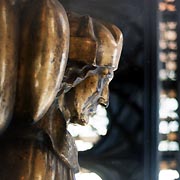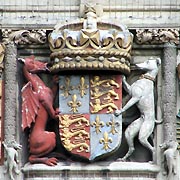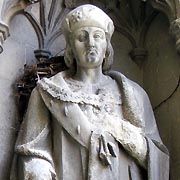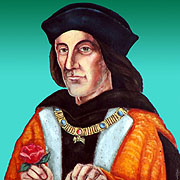
Henry VII (1457-1509) - King of
England 1485-1509
 |
 |

|

|
Henry was the son of Edmund Tudor, the Earl of Richmond, and Margaret Beaufort, who, as the last male line descendant of Edward III after 1471, was heiress to the Lancastrian claim to the English Crown. He was born at Pembroke Castle when his mother was only thirteen. His father had died just three months earlier. He was presented to his fatherís maternal half-brother, King Henry VI, during the brief Lancastrian Restoration of 1470-1 but, after the return of Edward IV in the latter year, had to seek asylum in Brittany. Both Edward IV and Richard III made attempts to induce the Duke of Brittany to surrender his guest and one of these was very nearly successful. When the Duke of Buckingham rose against Richard III, Henry was already off the English coast preparing to join him, but was unable to land. After this failure, Henry repaired to France, where English exiles gathered round him in 1484-5. On 1st August of the latter year, he sailed from Harfleur with about 2,000 men, landed in Wales and defeated and slew Richard III at the Battle of Bosworth, three weeks later.
Henry was well received in London as King Henry VII and was crowned in October 1485. Parliament entailed the Crown on him and the heirs of his body. He had, however, solemnly sworn in France to marry the Princess Elizabeth, now the undoubted heiress of the Yorkist claims, and thus to unite the two rival houses. The marriage took place at the beginning of 1486, but Henry was always careful to maintain that his title to the Crown was independent of his wife's. Two successive pretenders to the throne, each claiming to represent a Plantagenet prince, were easily disposed of ó Lambert Simnel at the Battle of Stoke, in 1487, and Perkin Warbeck, who gave more trouble, by adroit diplomacy with the various European Courts which had successively given him shelter, in 1497. When the French threatened, in 1490, to absorb Brittany, Henry felt it to be a necessary diplomatic move to get up an expedition against France and actually crossed the Channel and laid siege to Boulogne two years later. But he was able to let King Charles VIII understand that he was quite ready to treat for peace, and they made a treaty at Etaples. When Perkin Warbeck finally left Scotland in 1497, Henry concluded, with James IV, a truce, which soon became a peace and which was based upon the marriage of his elder daughter, Margaret, to the Scottish King. From 1499 to 1506, a real scion of the Plantagenet house, Edmund de la Pole, Earl of Suffolk, gave the King some trouble, but Henry, at last, got the Duke of Burgundy, who had protected Edmund, to surrender him in the latter year. In 1501, he was able to marry his elder son, Arthur, to Catherine of Aragon, princess of the nearly united Spain. When Arthur died in the next year, Catherine was betrothed to Arthur's brother, Prince Henry, now heir to the English throne. Henry VII's friendship with the crafty Spanish sovereigns, Ferdinand and Isabella, was never a cordial one, but the alliance between England and Spain remained fairly durable and was perhaps the strongest card in the English King's hand.
Two other points besides his adroit diplomacy are especially interesting in Henry's career. He was, to a considerable extent, a patron of commerce and perhaps pioneer of the system of Navigation Acts. He was also unquestionably the founder of that system of strong government which his son and grandchildren worked so much for the benefit of England. However, everything which he did was tentative and we feel, as we watch him, that he was never very sure of his ground. Avarice often led him to abandon great plans of the usefulness of which he probably felt no doubt; but the poverty of the Crown had been, for over a century, the greatest misfortune of England. Henry saw clearly that, if the country was to be governed with any success, he must become a rich king. In private life, his tastes were simple and frugal, and his only great expenditure was upon music and architecture. He seems to have had a good, though not, considering his mother's great reputation for learning, an especially learned education, but he was careful to bring up his children to be really learned in the best sense of the word. Above all things, Henry was a patient and laborious king and he died in 1509 at the age of 52, worn out from unceasing toil in the business of state.
Edited from CRL Fletcher's 'Historical Portraits' (1909)
The pictures on this page are cropped examples of images in the high resolution Nash Ford Photo Library. Please e-mail us for details of these or similar image availability at our very reasonable reproduction rates. Location release may be required for some photos.
Click for Next
Monarch